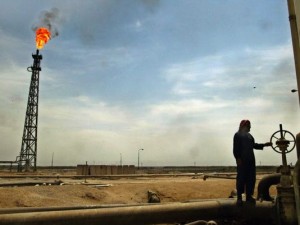
Islamic State earns $1M per day in black market oil sales
Islamic State militants are amassing wealth at an unprecedented pace, earning about $1 million a day from black market oil sales alone, a Treasury Department official said Thursday.
David Cohen, who leads the department’s effort to undermine the Islamic State’s (IS) finances, said the extremists also get several million dollars a month from wealthy donors, extortion rackets and other criminal activities, such as robbing banks. In addition, he said the group has taken in at least $20 million in ransom payments this year from kidnappings.
“With the important exception of some state-sponsored terrorist organizations, IS is probably the best-funded terrorist organization we have confronted,” Cohen, undersecretary for terrorism and financial intelligence, said in a speech at the Carnegie Endowment for International Peace in Washington. “It has amassed wealth at an unprecedented pace.”
The group, which extracts oil from territory it has captured across Syria and Iraq, wants to create a caliphate, or Islamic empire, in the Middle East. Led by Iraqi militant Abu Bakr al-Baghdadi, the Islamic State initially tried to oust Syrian President Bashar Assad, but other groups, including Al Qaeda central command, turned against IS because of its brutality.
Unlike the core Al Qaeda terrorist network, IS gets only a small share of funding from deep-pocket donors and therefore does not depend primarily on moving money across international borders. Instead, the Islamic State group obtains the vast majority of its revenues through local criminal and terrorist activities, Cohen said, acknowledging that Treasury’s tool are not particularly well-suited to combating extortion and local crime.
“They rob banks. They lay waste to thousands of years of civilization in Iraq and Syria by looting and selling antiquities,” he said. “They steal livestock and crops from farmers. And despicably, they sell abducted girls and women as sex slaves.”
In the Iraqi city of Mosul, Islamic State terrorists are reportedly going door-to-door, business-to-business, demanding cash at gunpoint, he said.
“A grocery store owner who refused to pay was warned with a bomb outside his shop. Others, who have not paid, have seen their relatives kidnapped. … We’ve also seen reports that when customers make cash withdrawals from local banks where ISIL operates, ISIL has demanded as much as 10 percent of the value.” Cohen said, using an acronym for the group.
Most of the group’s money, however, comes from extracting oil and selling it to smugglers, who, in turn, transport the oil outside territory under Islamic State control.
“It is difficult to get precise revenue estimates … but we estimate that beginning in mid-June, ISIL has earned approximately $1 million a day from oil sales,” Cohen said. Other estimates have ranged as high as $3 million a day.
Treasury said IS is selling oil at substantially discounted prices to a variety of middlemen, including some from Turkey, who then transport the oil to be resold. “It also appears that some of the oil emanating from territory where ISIL operates has been sold to Kurds in Iraq, and then resold into Turkey,” he said.
Cohen said the Syrian government also has allegedly arranged to buy oil from IS.
He noted that U.S-led airstrikes on the group’s oil refineries are threatening the militants’ supply networks and that Turkey and the Kurdistan Regional Government — the official ruling body of the predominantly Kurdish region of northern Iraq –are working to prevent IS oil from crossing their borders.
Cohen acknowledged, however, that IS moves oil in illicit networks outside the formal economy, making it harder to track.
“But at some point, that oil is acquired by someone who operates in the legitimate economy and who makes use of the financial system. He has a bank account. His business may be financed, his trucks may be insured, his facilities may be licensed,” he said.
“We not only can cut them off from the U.S. financial system and freeze their assets, but we can also make it very difficult for them to find a bank anywhere that will touch their money or process their transactions.”
Treasury also is going after individuals who donate money to IS and is urging officials in Qatar and Kuwait to do more to target terror financiers in their countries. A key, he said, is to restrict the militant group’s access to the international financial system.
SOURCE: Fox News




